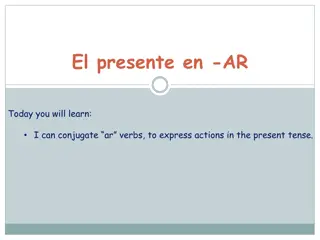
Latin Infinitives: Basics and Examples
Learn about Latin infinitives, their importance in verb conjugation, and how to interpret and use them in sentences. Delve into examples and understand the different conjugations associated with infinitives for a better grasp of Latin grammar.
Download Presentation

Please find below an Image/Link to download the presentation.
The content on the website is provided AS IS for your information and personal use only. It may not be sold, licensed, or shared on other websites without obtaining consent from the author. If you encounter any issues during the download, it is possible that the publisher has removed the file from their server.
You are allowed to download the files provided on this website for personal or commercial use, subject to the condition that they are used lawfully. All files are the property of their respective owners.
The content on the website is provided AS IS for your information and personal use only. It may not be sold, licensed, or shared on other websites without obtaining consent from the author.
E N D
Presentation Transcript
I. Infinitive Basics MarshLatin.wordpress.com
What is an infinitive? When you look up a Latin verb in a Latin-English lexicon or dictionary, you will see 4 entries (principal parts) for most verbs. The 2nd entry, usually abbreviated "- are," "-ere" or "-ire," is the infinitive. More specifically, it's the present active infinitive, which is translated into English as "to _____." The vowel (a, e, or i) of the infinitive indicates which conjugation it belongs to. I. II. III.
Example the dictionary entry for a verb in Latin: Laudo, -are, -avi, -atus. Praise
Looking up a verb The 1st entry in the dictionary entry is the present, active, singular, 1st person form of the verb. Note the -o ending. Laudo 'I praise' is a first conjugation verb and therefore has an infinitive ending in "- are." The entire present active infinitive of laudo is laudare, which we translate into English as "to praise.
On Interpreting the Infinitive Although it may be easy enough to translate the infinitive as "to" plus whatever the verb is (plus whatever person and tense markers may be required), it can be hard to explain the infinitive. It acts like a verbal noun, for which reason, it is sometimes taught alongside the gerund.
Tense in Latin Complementary Infinitives As an example of why tense is a difficult concept with present infinitives, Allen says that in Cicero and Caesar, 1/3 of their present infinitives follow the verb possum 'to be able'. If you are able to do something, that ability precedes the time of the statement.
Other Uses of the Infinitive An infinitive can also be used as the subject of a sentence. The subjective infinitive is found after impersonal expressions like necesse est 'it is necessary'. Necesse est dormire. it is necessary to sleep.
What do I need to know? 2ndprincipal part of the verb Ends with an -re The to _____ version of the verb Used most often with possum or volo Determines to what CONJUGATION a verb belongs
CONJUGATIONS -are 1st -Ere 2nd -ere 3rd -ire 4th






















